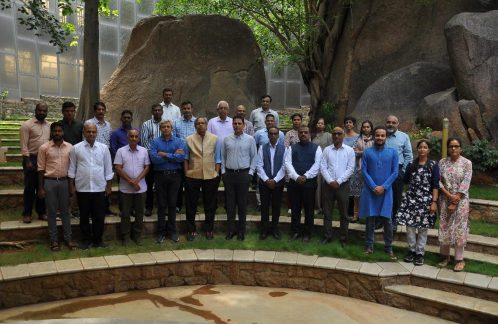CSIR - Centre for Cellular & Molecular Biology
Council of Scientific and Industrial Research
The Innovation Engine of India
Date :September 3, 2024

Hyderabad, 5th Aug, 2023: CSIR-CCMB organized a one-day consultative meeting on “Collaborative strategies for managing aquatic biological invasions” on 05th August, 2023 at the Laboratory for the Conservation of Endangered Species (LaCONES-CCMB), as a part of One Week, One Lab program. The purpose of the consultation meeting was to bring together experts, researchers, policymakers, and other stakeholders from India to exchange knowledge, discuss challenges, and explore effective strategies for managing and mitigating the impacts of aquatic invasive species.
Dr Umapathy, Senior Principal Scientist at CSIR-CCMB and the key organizer of the meeting
commented, “Studies say that invasive species have costed Indian economy at least 120-180 billion Indian rupees. Our own studies show widespread nature of some of the catfish species in India. But there is no comprehensive study bringing together data on aquatic invasive species in India.”
Dr Rajat Kumar, IAS, Special Chief Secretary to Govt. of Telangana, Irrigation and Environment and Science and Technology & Chairman of Telangana Biodiversity Board was the Chief Guest, along with Dr L Narasimha Murthy, ARS, Chief Executive In-charge, National Fisheries Development Board, Govt of India was the Guest of Honour. Dr Kumar said, “The documentation of invasive species, the mechanism of their spread, their impact on environment, food security and health are lacking today. It is very timely to bring out this information.”
During the sessions, experts highlighted the various aspects of aquatic biological invasions. This included the aquatic biodiversity of Telangana, aquatic invasive species of India, role of aquarium petindustry in invasions, ecological impacts, aquatic invasions in islands and marine ecosystems, tools and techniques to combat aquatic invasions and carbon sequestration of invasive species. There were also brainstorming sessions addressing the research gaps in biological invasions, ecological and economic impacts of aquatic species, and policies and regulatory frameworks for effective management of aquatic invasions.
A total of around 60 people including officials from Fisheries and forest departments, Telangana Biodiversity board, NGOs working towards environmental issues, World Wildlife Fund, senior research scholars, post-doctoral fellows and scientists from various institutes such as University of Kerala, Kerala University of Fisheries and Ocean Studies, Wildlife Institute of India Dehradun, National Institute of Oceanography Goa, ATREE Bengaluru, SACON Coimbatore, Osmania University Hyderabad.
Dr Vinay Nandicoori, Director, CSIR-CCMB said, “This meeting has helped us to bring collective thoughts on the issues, management solutions, ground level interventions to monitor and eradicate and aquatic invasive species, and also to protect the native biodiversity, safeguard the rural economy and improve sustainable aquaculture practices. In addition, this meeting has aided in forming a network of stakeholders from various sectors who are committed towards mitigating one of the biggest biodiversity threats.”